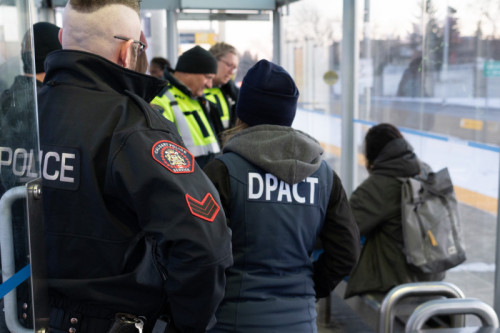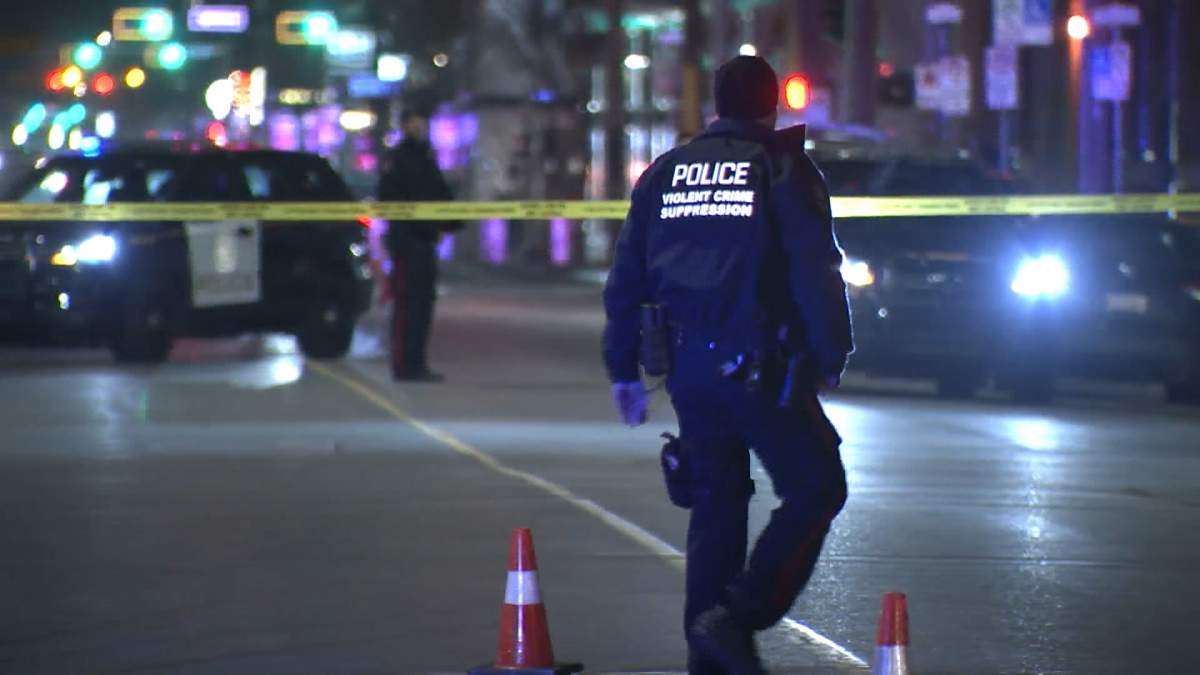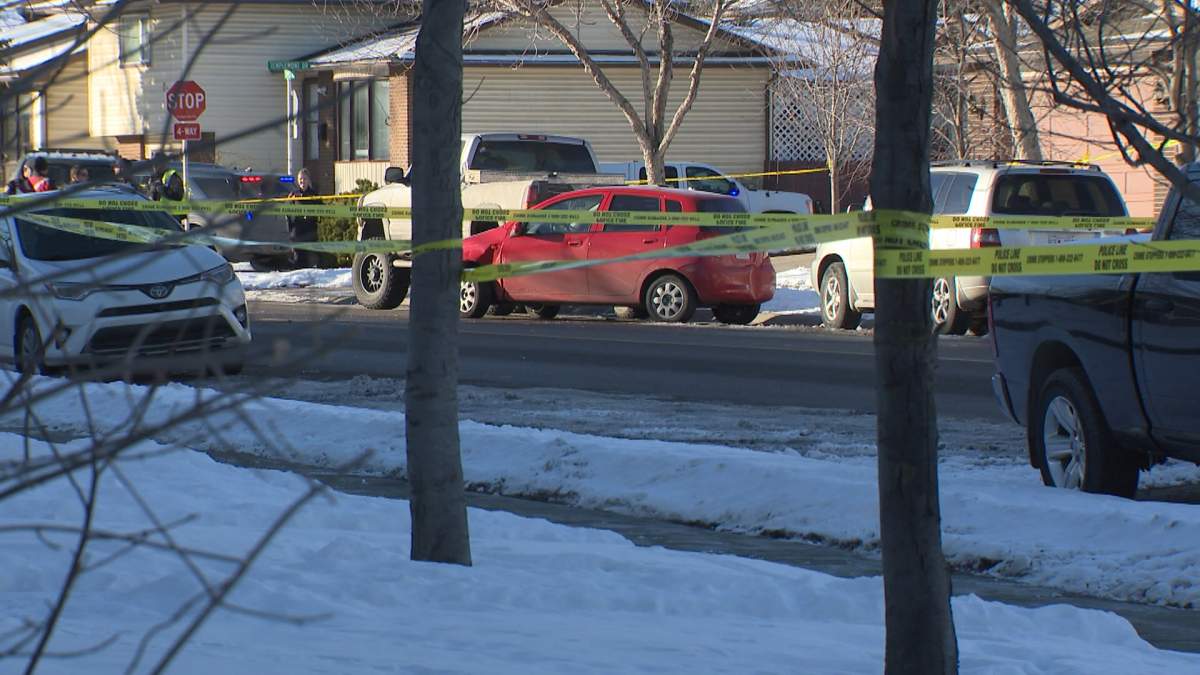This past year, Calgary police dealt with issues and concerns around gun violence, transit safety, the drug crisis, and an increase in demonstrations on Calgary streets. Calgary Police Service Chief Constable Mark Neufeld sat down with Global News Morning anchor Dallas Flexhaug to reflect on 2023 and look ahead at the force’s priorities for 2024.

Gun violence
When we sat down with Neufeld on the morning of Dec. 18, there had been 95 shootings in Calgary to date in 2023. (By Dec. 20 that number had risen to 97).
There have been over 500 shootings across all of Alberta, representing an increase of more than 35 per cent over the previous year.
The number of shootings in Calgary is trending the other way — down more than 20 per cent compared to the 2022 numbers, which Neufeld says is on par with the five-year average.
Neufeld attributes the drop in gun violence responses to a particularly high year in 2022.
“We were able to buck that trend… we were able to do a bit more prevention. We have a very sophisticated response.”
Still, Neufeld says he’s not celebrating those numbers.
“I think these are serious, serious issues that actually have a big impact in our communities and one is one too many.” He goes on to say that there is a lot more work to do and it will continue to be a priority in 2024.
‘A bit less civility’
On Dec. 12, a stunning case of road rage played out on the streets of Calgary.
One driver died and another was charged with manslaughter. We asked the police chief if he’s noticed changes in overall human behaviour in what CPS deals with on a daily basis. He said, it’s hard to ignore.
“Anecdotally I would say, yes. There’s nothing scientific about this, but certainly we are seeing situations like the one from Dec. 12, situations that ordinarily people would be able to communicate their way out of or maybe not permit to escalate in the way that they do.”

Get breaking National news
Neufeld went on to say: “We see it in interactions between couples and families, we see it with young people, frankly we see it on transit and in public spaces where there seems to be a bit less civility, a little bit less respect for authority, and also I think people are struggling with their mental health. We’ve seen an increase, again anecdotally, in the number of suicides, even just this month we’ve had a number of shocking cases officers have had to deal with. So we are definitely seeing it.”
Drug crisis
This year has been one of the deadliest on record for drug poisonings in Calgary.
“I think we are going to be on pace for a record by the end of the year in terms of drug poisonings or overdoses,” said Neufeld.
The chief says there are several ways police try and tackle drug issues in the city. A big priority is prevention and education for children through programs through the Calgary Police Youth Foundation, YouthLink, and talking to students in the public school system.
Neufeld also says drug supply is an issue. CPS partners with ALERT (Alberta Law Enforcement Response Teams) to combat the importation, trafficking and manufacturing of drugs.
Locally, Neufeld says CPS prioritizes drug trafficking. “A lot of that will intersect with organized crime and violence that we talk about in the city.”
Neufeld says officers are also out on the streets every day connecting with people who face addictions issues.
“Now as the province builds out its recovery oriented systems of care and there’s a virtual opioid dependency program, there’s more and free access to treatment and treatment beds, there are more options, I think, for officers to get people connected to the supports that they need if they are open to it.”

Homeless encampments
Calgary police dismantled a number of homeless encampments this year. Chief Neufeld says the approach of police has not changed, saying they can’t let encampments become entrenched or established for a long period of time. With no running water, no bathrooms, no garbage pick up, Neufeld says they become problematic very quickly. The police chief says this year there were several cases that involved a lot of criminality. “In one case we had ATVs, pop machines, weapons and stolen property from all over the place.”
Neufeld says the police service works closely with the encampments teams. “We are scaling up our commitment to those teams mainly because our social service partners are feeling right now like they need police support to feel safe to do the work that they do in those areas.”
Neufeld says at times the response is a criminal justice one, while other times it’s about finding out why people are sleeping rough, whether it be housing issues, mental health, or addictions.
“If we are not engaging people and if we don’t know who is there and why, we can’t get them out. They literally become disconnected from all supports and then they are just out there and I think when you let that happen, we’ve failed.”
Looking ahead to the new year
Dealing with the ongoing gun violence in Calgary is a continued priority for CPS in 2024. “Just because we are running out of months on the calendar doesn’t mean we are going to run out of issues with respect to gun violence. That’s going to continue to be an issue with some of the brazen shootings we’ve seen and some of the retaliatory violence. That’ll continue to be on the radar after Jan. 1.”
We know Calgary police has the provincial funding to hire 50 new officers in 2024. CPS is also part of the city’s new Transit Safety Strategy approved in November’s municipal budget. Chief Neufeld says the force recognizes transit safety is a big deal for Calgarians and he’s looking forward to implementing new measures, if he can get the right resources in place.
“I think the safe public spaces with the onboarding of the 50 officers, that depends on recruitment and retention and actually being able to deploy those officers in the first couple quarters of the year.”
Neufeld says he’s also looking forward to further integration between CPS and its social services partners to help better deal with ‘heavy systems users.’
“There is a number of people we know we are having contact with repeatedly and we also know that our partners in health, whether it be EMS or emergency wards, or transit or bylaw are also having contact with them. So we think it makes sense, rather than to wait for a crisis, to be able to go proactively and deal with some of those situations. I think will be very positive. That’s also on the plate for early 2024.”












Comments